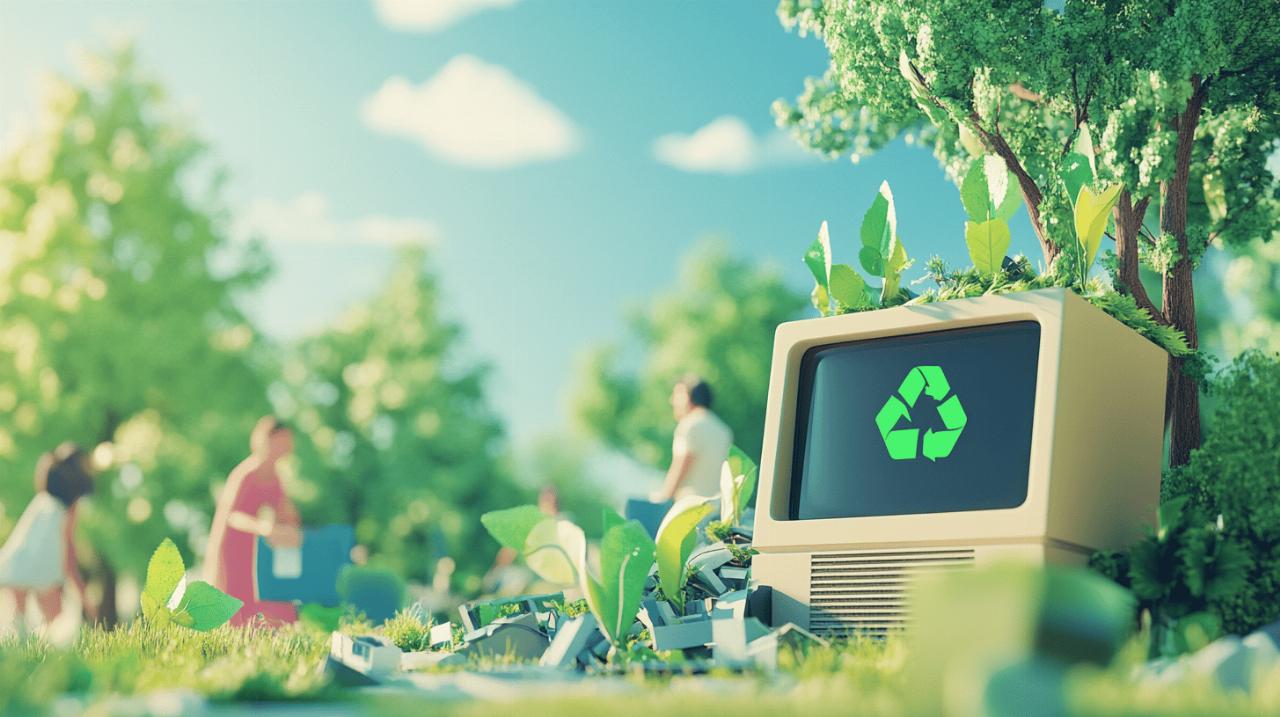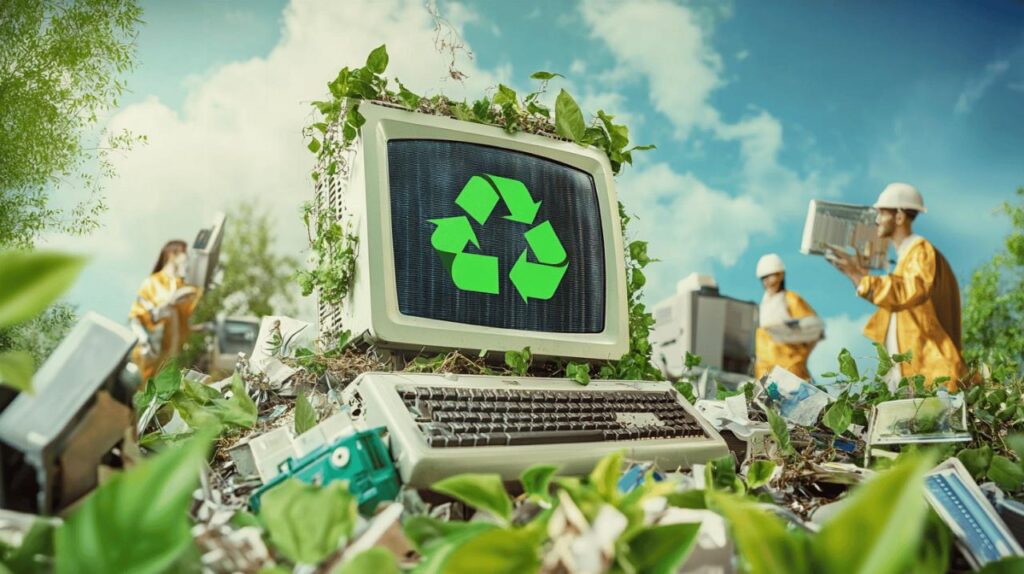When it comes to decluttering your home or office, old computers and electronic devices often pose a particular challenge. Unlike regular household items, computers contain sensitive data and potentially harmful components that require special handling. Fortunately, London offers numerous charity schemes that can give your outdated technology a second life while benefiting communities in need. This guide explores how you can responsibly recycle your old computers through these valuable initiatives.
Understanding the Impact of Electronic Waste in London
Environmental consequences of discarded computer hardware
The environmental toll of improperly discarded electronics is staggering. According to United Nations projections, global e-waste is expected to reach a massive 82 million tonnes by 2030. In London, with its dense population and high technology usage, the problem is particularly acute. When computers and laptops end up in landfills, they release harmful chemicals like lead, mercury, and cadmium into the soil and water table. Additionally, the rare metals and valuable components inside these devices represent a significant loss of resources when not properly recovered through e-waste recycling programmes.
How londoners can make a difference through proper it disposal
By choosing responsible disposal methods for your electronic waste, you directly contribute to landfill reduction and environmental sustainability. Proper computer disposal isn't just about environmental protection—it's also about digital inclusion. When you donate functioning or repairable devices to charity collection services, you're helping bridge the digital divide that affects vulnerable communities across London. Many organisations specifically target their electronic reuse programmes to support refugees, elderly residents, and those experiencing homelessness, ensuring that your outdated technology can still serve a valuable purpose in promoting digital accessibility.
Preparing Your Old Computers and Laptops for Donation
Securing your personal data before recycling electrical devices
Before donating your old computer or laptop, it's essential to ensure all personal information has been completely removed. Most reputable London charities that accept electronic donations offer secure data destruction services as part of their collection process. Organisations like LCR Charity and WeeeCharity provide professional data wiping services, with the latter even offering shredding options and digital waste certification for businesses requiring additional security. These services employ DBS-checked staff and use barcoded tracking systems for data-sensitive items, giving you peace of mind that your information won't fall into the wrong hands during the recycling process.
Assessing whether your equipment has a second life potential
Not all old computers are suitable for reuse, but many devices that seem outdated to you could still be valuable to others. When evaluating your equipment, consider its age, functionality, and physical condition. Even computers that don't power on might contain salvageable components. Charities like SocialBox.Biz specifically look for old MacBooks, Apple computers, PCs, and telephones that can be refurbished for their technology refurbishment programmes. They prioritise electronic reuse before recycling as this approach more effectively reduces Scope 3 emissions and creates greater social impact through their digital inclusion initiatives.
London charity schemes accepting computer donations
Local services that refurbish and redistribute it products
Several established charities across London specialise in computer donation and redistribution. LCR Charity (registered charity number 1203364) collects unwanted computers from your door, refurbishes them, and distributes them to families, schools, and other charitable organisations. Based at 50 Wakemans Hill Avenue in London, they offer free collection services that can be booked online. For small donations (fewer than five items), they suggest a £20 contribution to support their work. Another notable option is Computer Aid, a registered charity operating across England, Wales, and Scotland with offices in London and Manchester. They focus on laptop donations, which proved particularly valuable during lockdowns when many UK schools needed technology for remote learning.
How donated devices benefit community projects
When you donate through these London charities, your old technology creates ripple effects of positive change. WeeeCharity, for instance, uses their technology refurbishment programme to train volunteers who are unemployed, disabled, or have learning difficulties, providing them with valuable work skills. SocialBox.Biz specifically targets their redistribution efforts toward vulnerable communities, including refugees, elderly individuals, and those experiencing homelessness. By supporting these initiatives, your donation contributes to corporate social responsibility efforts and helps address digital accessibility challenges faced by disadvantaged communities throughout London.
Alternative recycling options for beyond-repair electronics
Responsible disposal pathways for various computer components
For electronic waste that's truly beyond repair, responsible WEEE recycling (Waste Electrical and Electronic Equipment) remains essential. WeeeCharity, operating under waste exemption WEX242563, accepts all sorts of electrical items regardless of condition—whether brand new, perfectly working, or completely non-functional. They ensure proper electronic waste management by separating and processing different components according to environmental regulations. Their free collection service extends throughout London, including within the ULEZ and Clean Air Zones, making responsible disposal convenient for residents and businesses alike. Following collection, they provide waste transfer documentation electronically and send data destruction certificates after processing.
Extending the Duration of Your Technology's Usefulness
The most environmentally friendly approach is to extend the life of your existing technology whenever possible. Regular maintenance, software updates, and occasional hardware upgrades can significantly extend the duration of your computer's useful life. When you do need to upgrade, consider refurbished options that support the circular economy. For businesses, implementing a technology lifecycle management plan that includes donation of outdated equipment to charity collection services can form an important part of your environmental sustainability strategy. This approach not only reduces waste but also supports your organisation's Scope 3 emissions targets and demonstrates your commitment to corporate social responsibility in a tangible way.
How businesses can support digital inclusion through computer donation
Businesses across London have a brilliant opportunity to make a real difference by donating their old computers and IT hardware rather than simply binning them. With growing concerns about electronic waste management and digital accessibility, corporate computer donation schemes are becoming an essential part of responsible business practices.
Several London charities now offer free collection services for unwanted computers, making it easier than ever for companies to support vulnerable communities while meeting their environmental sustainability goals. For instance, LCR Charity (charity number 1203364) collects unwanted computers in London, refurbishes them, and distributes them to families, schools and other charities who need them, helping to bridge the digital divide.
SocialBox.Biz takes a similar approach, focusing on securely wiping data from donated devices before refurbishing them for refugees, elderly people, and those experiencing homelessness. This electronic reuse approach delivers much greater social value than simply recycling the components.
Setting up corporate e-waste recycling programmes
Establishing an effective e-waste recycling programme starts with choosing the right charity partner. WeeeCharity (UK registered charity number 1169658) offers free recycling of computers and electrical equipment to businesses across London, including collections within London's ULEZ and Clean Air Zones. They collect all types of electronics regardless of condition.
Data security remains a top concern when donating technology. Fortunately, most charity collection services now offer secure data destruction as standard. WeeeCharity provides free data wiping services, including shredding, with DBS-checked staff and digital waste certification. Similarly, LCR Charity guarantees secure data wiping for all donated equipment.
The logistics of tech donation are straightforward. Most charities offer online booking systems for free collections. Once arranged, they'll collect directly from your premises, provide tracking for data-sensitive items, and supply proper documentation such as Waste Transfer Documents or Donation Notes. WeeeCharity even emails data destruction reports and certificates after collection.
Many organisations also offer technology refurbishment training to volunteers from disadvantaged backgrounds, creating a double social impact through both digital inclusion and skills development.
Measuring the Impact on Scope 3 Emissions and CSR Goals
Donating old computers rather than discarding them delivers measurable benefits for corporate social responsibility initiatives. The UN projects global e-rubbish to reach 82 million tonnes by 2030, making landfill reduction efforts increasingly vital.
By prioritising reuse before recycling, businesses can significantly reduce their Scope 3 emissions. SocialBox.Biz specifically notes that their donation programme helps companies meet these targets while supporting digital inclusion initiatives. WEEE recycling (Waste Electrical and Electronic Equipment) remains important, but extending the life of existing technology creates even greater environmental value.
The social impact is equally significant. Computer Aid highlights how donated laptops have supported UK schools during lockdowns while also helping communities in developing countries. This creates compelling content for CSR reports and demonstrates genuine commitment to addressing digital inequality.
For businesses looking to quantify their impact, many charities can provide metrics on how many people benefit from donated devices, the amount of e-waste diverted from landfill, and even the carbon emissions saved through reuse rather than manufacturing new products.
Setting up a regular donation schedule for outdated but functional IT equipment ensures that your business maintains both environmental sustainability credentials and supports vital digital accessibility initiatives across London.







